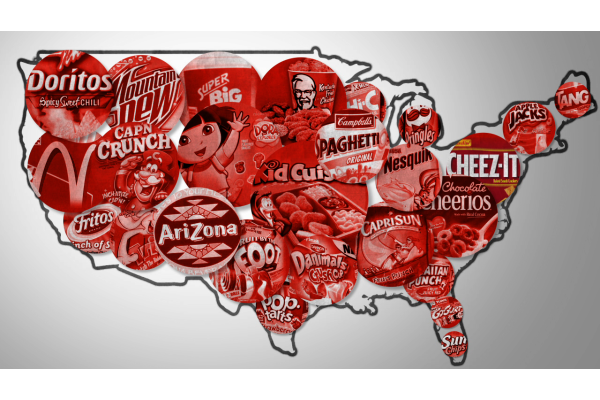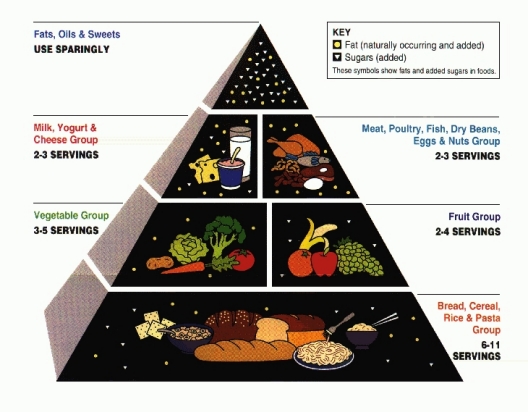
What lies are we being told about the ‘official food pyramid’? Here’s what you need to know.
When many of us think of the food pyramid, we tend to trust it. Well, now there might be more to consider as it might more than a “simple diet plan“.
We’ll look at where the data comes from that feeds these recommendations, and the flaws that might be causing lies about dietary recommendations.
The government uses the food pyramid to set forth its target guidelines for proper nutritional requirements. We naturally assume that the information used to derive these standards must be thoroughly researched, peer-reviewed, and free from any sort of controversy.
In this assumption, you would be wrong.
The information they use to come to those recommendations is more “iffy” than most of us realize.
Want to know the worst part?
This information is what is STILL being used to set forth the latest guidelines.
Who Is Affected by Lies About Dietary Recommendations?
If incomplete information is used to form the recommendations we trust, we have a problem. What this ultimately means is, the dietary guidelines many of us look to for how to get adequate nutrition may be based on what is, essentially, unrepresentative data. Think about who might be affected by lies about dietary recommendations and an unstable food pyramid.
- Businesses feeding their employees.
- Individuals who are misinformed.
- Schools relying on the pyramid to plan their students’ cafeteria meals.
- Colleges planning their student meal plan options.
So what does that mean for all those groups?
That all the people being fed off of these standards are not putting their best foot forward with the healthiest diet they could be eating. That is a major problem.

Do Epidemiological Studies Expose Lies About Dietary Recommendations?
This type of study refers to the study of casespecific populations of people. Basically, a controlled population is studied and from this sample pool, patterns are observed. Scientists then make extrapolations of causality. In other words, they determine what caused the patterns.
While these studies are great to give us a rough idea of patterns in a given pool, there’s more to the issue. These pools may provide skewed data that renders the advice taken from it as less valuable than originally thought.
The main thing to remember:
There is a difference between correlation and causality when it comes to health.
Correlation: a mutual relationship or connection between two or more things. This can mean nothing more than when ‘a’ occurs, sometimes ‘b’ does too.
Causality: the relationship between cause and effect. In this context, it means that one event is dependent on another. No maybes.
For example:
There are claims that you can reduce your chance of things like heart disease by keeping your caloric intake of fat low.
These may be correlated to one another, but this does not necessarily mean that one caused the other. However, this is what longstanding claims imply.
It’s time to wake up.
Are Changes Coming to the Way Dietary Guidelines Are Derived?
Since the data used to derive these statistics has continued to be questioned, the government is seeking to set their new guidelines with more empirical data.
That’s good news.
This data will come from peer reviewed studies with larger, more random sample populations. In addition, they plan to use control groups and other measures that help to improve the quality of the data obtained.
What does this mean for the food pyramid?
Better data means the opportunity for better recommendations. That means the chance to end lies about dietary recommendations.
While it is certainly a good step to have more rigorous and tested data, there are still extrapolations that will be made. This means there will always be the possibility of error. Sometimes people draw the wrong conclusions.
There are issues where, technically, causality COULD be tested over the longterm, but these studies would be neither feasible or ethical (such as studies to directly connect smoking to cancer or making people eat a randomly assigned diet for a long period of time).
This would be dangerous.
So, in the end it isn’t as though epidemiological data is useless. However, it should not be the only basis for all the decisions made regarding dietary guidelines. This incomplete perspective can result in misinformation and lies about dietary recommendations.
So, Why the Controversy?
Part of the problem with this is that there was randomized, peer-reviewed data available when these guidelines were last updated. There were empirical studies that would have given more weight and validity to the guidelines the government came up with. Using the results of those tests would have changed the very nature of the dietary recommendations.
They were, however, not used as the basis for federal nutritional guidelines, or even as a piece of evidence to help them determine their guidelines.
This is where the problem really lies.
There has already been better data that could be used to derive these guidelines and yet it is passed over.
The Calories from Fat Debacle
One of the longrunning mottos from our government about diet and nutrition is that our risk for certain cardiovascular diseases is reduced if we take in a smaller percentage of our total calories from fat.
While this might make some sense, it led to a dramatic increase in the market for lowfat products, spurning an almost entirely new “diet” industry.
The problem is that the data used in making these claims was not exactly representative of the population as a whole. A significant portion of people in the study were already at high risk for heart disease, so it skewed the benefit of dietary changes as being the panacea.
The argument for a reduced risk of coronary heart disease from eating no fat has been unfounded.
Even with these high-risk populations, they found that there was no significant change in risk. There was no difference in mortality rates between those who changed their diet and those who did not.
While we’re on the subject, it turns out that healthy natural fats like avocados are excellent for you.
Lies About Dietary Recommendations on Cholesterol?
One change in the tide that is already in the works is going to shock many people.
For many years cholesterol was one of the biggest enemies of the federal guidelines on nutrition. Now, rather than telling us to limit our cholesterol intake, they are seeking to now say that cholesterol overconsumption is ‘not a concern.’ So this could lead to the diet such as the Paleo Diet becoming more popular.
In fact, they are trying to repeal the recommended limit of 300 mg/day.
What the studies have found is that, apart from those with certain genetic predispositions,
Our levels of “good” and “bad” cholesterol have little to do with the amount of cholesterol we consume in our diet.
Conclusion
The government’s recommended nutritional guidelines have long been criticized. Presenting incomplete or flawed data as thoroughly researched and reliable is the same as lies about dietary recommendations.
From the use of poor data that does not accurately reflect the population as a whole, to failing to use more rigorous data when it was available, it is easy to see why many are so skeptical of the guidelines.
With new proposed changes to the guidelines, based on better data, we are seeing some very popular misunderstanding come to light.
Much of what we thought about dietary guidelines has flipped on its head. We can only hope this will lead to more accurate recommendations.
Interested in learning more? Register for our exclusive Webinar on Why Most Diet Programs Fail by clicking here.
Get after it,
Kusha
Latest posts by Terry M (see all)
- Garage Gyms - Aug 1, 2018
- Kettlebells – Why They Should Be Added To Your Routine. - Jul 24, 2018
- Weight Belts: What Are They Really For? - May 31, 2018














I studied similar studies because I was preparing an essay about the specifics of nutrition in educational institutions. This is a rather specific topic. That’s why I came here https://essaybox.org/samples/ to find out about examples of essays that students complete. Thanks to this information, it was easier for me to formulate the text. My essay received the highest mark among our students.